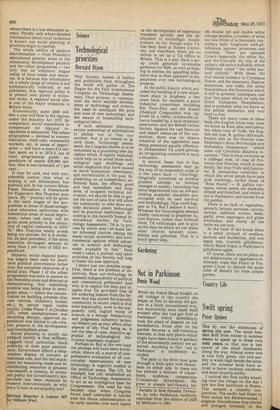Gardening
Not in Parkinson
Denis Wood
When my friend Maud bought an old cottage in the country she began at first to develop the-garden in a fairly conventional way, but eccentricity soon made itself evident after she had got hold of Parkinson"' which immediately took the place of Debrett on her bookshelves. From then on the garden became a self-conscious exercise, in that only plants which might have been found in gardens of the seventeenth century are ad' mitted. Anything in fact 'not in Parkinson' is snobbishly excluded.
The path to the front door goes • through a little lawn with flowerbeds on either side. In these she has planted a mixture of columbines, scabious, campanulas (Campanula pyramidalis, the great or steeple bell-flower), the * Paridisi in Sole Paradisi Terrestris, by John Parkinson, faithfully rpnrinted from the edition of 1629 by Methuen in 1904. old double red and double white cottage peonies, a number of what we now think of as biennials, canterbury bells, foxgloves, wall-gilloflowers, pansies, primroses and cowslips. There are splendid ' Crown Imperialls, the white lily, and the Convally lily (lily of the valley); old native daffodils, which Parkinson called "the wilde bastard daffodil." With these, the true blacke hellebor or Christmas flower, and the mezereon, Daphne mezereum, and irises, the white flowerdeluce, Iris florentina which is still in growers' catalogues, and that fine plant which he calls the Great Dalmation which, and is probably what we know as Iris pallida dalmatica, and very hard to find.
There are many roses in these beds, the English white rose, what we know as Rosa alba semi-plena, the white rose of York; the English red rose, R. gallica officinalis, known also as the Provins rose; Parkinson's Rosa Provincialis sive Hollandica Damascena; "which some call Centifolia Batavica incarnata." This is what we know as a cabbage rose, or rose of Provence (not Provins, which is near Paris); the true York and Lancaster, R. damascena versicolor, in which the white petals have pale pink markings, unlike those of 'Rosa mundi — R. gallica variegata, whose petals are markedly striped and blotched, and which is not in Parkinson, and barred from the garden.
There is no lack of vegetables, spinach, lettuce, parsnips, carrots, turnips, radishes, onions, leeks, garlic, even asparagus and globe artichokes, and nearly all the herbs we use now.
'At the back of the house there is a small orchard of medlars, quinces and mulberries, and one • apple tree, Cornish gillyflower, which Maud hopes is Parkinson's gilloflower apple.
Of course, there are no phlox or tall delphiniums, or aggressive remontant roses like Peace or Fragrant Cloud, to disturb the quiet calm of Maud's far from simple garden.


































 Previous page
Previous page